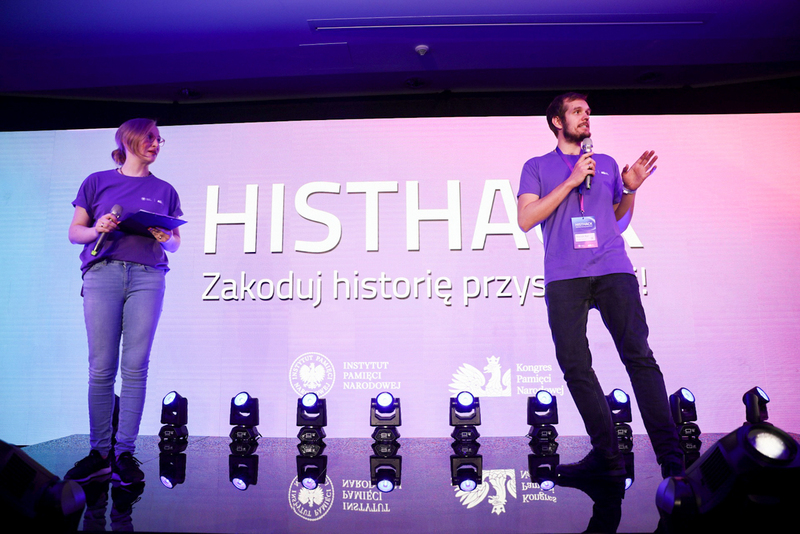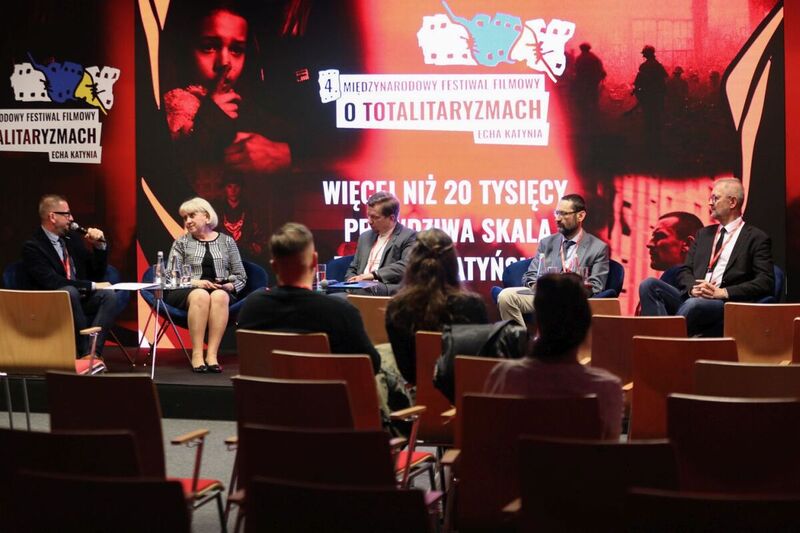The highlight of the day – as far as the debates are concerned – was the discussion on the IPN flagship project, "Trails of Hope. The Odyssey of Freedom." Ambassadors Anna Maria Anders and Radosław Gruk, Consul Magdalena Pszczółkowska, Director of the Freedom Park in South Africa Jane Mufamadi, Head of Alabama Veterans Museum Sandra Thompson and the IPN President Karol Nawrocki were talking about the project goals, reception and schedule.
There were other panels as well: one that opened the second Congress day dealt with the topic of war reparations through the eyes of politicians. The speakers were Arkadiusz Mularczyk and Jarosław Sellin, and Krzysztof Ziemiec moderated the debate.
In another room, Bogdan Musiał, Konrad Graczyk, Aleksandra Namysło and Andrei Zamoiski talked about rescuing persecuted Jews in German-occupied Europe, their debate moderated by Martyna Grądzka-Rejak.
WWII German crimes in occupied Poland were the topic of a panel featuring the IPN scholars Grzegorz Bębnik, Tomasz Ceran, Tomasz Domański, and Tomasz Sudoł, moderated by Monika Tomkiewicz.
14 April 2023 — Discussion Panels
Main stage
War reparations in the 20th century through the eyes of politicians
Participants: Arkadiusz Mularczyk (MSZ), Jarosław Sellin (MKiDN), moderator Krzysztof Ziemiec
"Trails of Hope. The Odyssey of Freedom" through the eyes of those involved in the project
Participants: Anna Maria Anders, Radosław Gruk, Jane Mufamadi, dr Karol Nawrocki (IPN), Magdalena Pszczółkowska, Sandra Thompson; moderator Tomasz Łysiak
"Trails of Hope. The Odyssey of Freedom" is a flagship project launched by the Institute of National Remembrance to commemorate the military effort of Gen. Anders’ Army and the fate of civilians evacuated from the USSR. This undertaking, initiated by the President of the Institute of National Remembrance, Karol Nawrocki, Ph.D., planned for the years 2022–2025, envisages, among others, the presentation of a dedicated exhibition in all countries traversed by the Army led by Gen. Anders together with the Poles evacuated from the USSR. The project shows the contribution, determination and commitment of Poles in the fight to free the world from totalitarianism. Its aim is the international promotion of Polish history, the fate of the Polish diaspora and the bravery of the Polish soldiers fighting for freedom in the name of respect for human dignity. The title of the project refers to the many years of Odysseus’ journey to Ithaca after the victorious Trojan War.
The popularization of the subject of the journey and the combat trail of the army led by Gen. Anders in the Middle East and the Western Front as well as the fate of civilians who left the territory of the USSR together with the Army is one of the key tasks of the Institute of National Remembrance.
The exhibition consists of a general part and elements which present the ties between a given country and the local community with the soldiers and civilians of Gen. Anders’ Army It is also accompanied by a multi-language catalogue. Our aim was to present the materials stored in our archives and also to reach out to people who remember the wartime events as well as their families. We conduct numerous interviews with those who witnessed history. The exhibition's opening is frequently accompanied by commemorative, educational and cultural activities. So far, the exhibition has been presented abroad in South Africa (Pretoria and Johannesburg), Iran, Kazakhstan, the U.S. (Houston, Athens), Canada, Georgia and Uzbekistan. The scope of the project will cover more than 50 countries around the world, located on six continents. The project is an example of historical policy aimed at a difficult, demanding audience that knows nothing or very little about the history of Poland and often has a very distorted image of it.
A series of new publications, educational materials in various languages will be issued as part of the project. Many concerts, contests, meetings and scientific conferences are also planned. An important part of the project is the restoration of memorial sites located in various parts of the world, from Asia, the Middle East, Europe, Africa to both Americas. The project envisages proper commemoration of Polish soldiers and civilians whose graves are scattered all over the world. Commemorative plaques and monuments are also being erected. We are also carrying out the restoration of existing commemorative sites. One example of such efforts is the restoration of the cemetery in Rusape, where several of the more than 700 residents of the refugee settlement which functioned between 1943 and 1946 in the former Southern Rhodesia are laid to rest. We will create new commemorative sites in cooperation with local authorities.
In addition, a website dedicated to the subject has been created, containing various multimedia projects related to the undertaking. The exhibition is planned to be opened in, among others, Canada, the U.S., Mexico, Brazil and Argentina. Next year, the project will reach such locations as Great Britain, France, Belgium, the Netherlands and Italy.
2:00 p.m. — 3:30 p.m. Clash with totalitarianisms. Poland 1939-1945
Participants: prof. Stéphane Courtois, prof. Stephen Hicks (Rockford University),prof. Grzegorz Kucharczyk (IH PAN), David Satter, moderator Krzysztof Ziemiec
Historical Debut of the Year
The competition is intended for authors of unpublished master's and doctoral theses on the history of Poland and Poles in the 20th century. It is announced annually in two categories: master's theses and doctoral theses; this year is the 15th edition of the competition. The works, submitted by the authors, were evaluated by the Competition Commission, appointed by the President of the Institute of National Remembrance and the Director of the Institute of History of the Polish Academy of Sciences. The winners in each category receive a commemorative diploma, a cash prize and a publishing contract to publish all or part of the work.
Helping Jews under German occupation — European perspective
Participants: dr Konrad Graczyk (IPN), prof. Bogdan Musiał, dr Aleksandra Namysło (IPN), dr Andrei Zamoiski (Freie Universität Berlin), moderator: dr Martyna Grądzka-Rejak (IPN)
War reparations in the 20th century through the eyes of journalists
Participants: Wojciech Biedroń, Wojciech Surmacz (PAP), prof. Jan Żaryn, moderator red. Tadeusz Płużański
German crimes in occupied Poland
Participants: dr hab. Grzegorz Bębnik (IPN), dr Tomasz Ceran (IPN), dr Tomasz Domański (IPN), dr Tomasz Sudoł (IPN), moderator prof. Monika Tomkiewicz (IPN)
War reparations in the 20th century through the eyes of scholars
Participants: dr Konrad Graczyk (IPN), r. pr. Beata Komarnicka-Nowak, prof. Bogdan Musiał, dr Krzysztof Rak (Fundacja Współpracy Polsko-Niemieckiej), moderator Rafał Dudkiewicz
The fight and resistance of the Jewish community during the German occupation of Poland
Participants: prof. Grzegorz Berendt (Muzeum II Wojny Światowej), dr Alicja Gontarek (IPN), dr hab. Sebastian Piątkowski (IPN), dr Mateusz Szpytma (IPN), moderator dr Tomasz Domański (IPN)
New Technologies at the Congress of National Remembrance
















